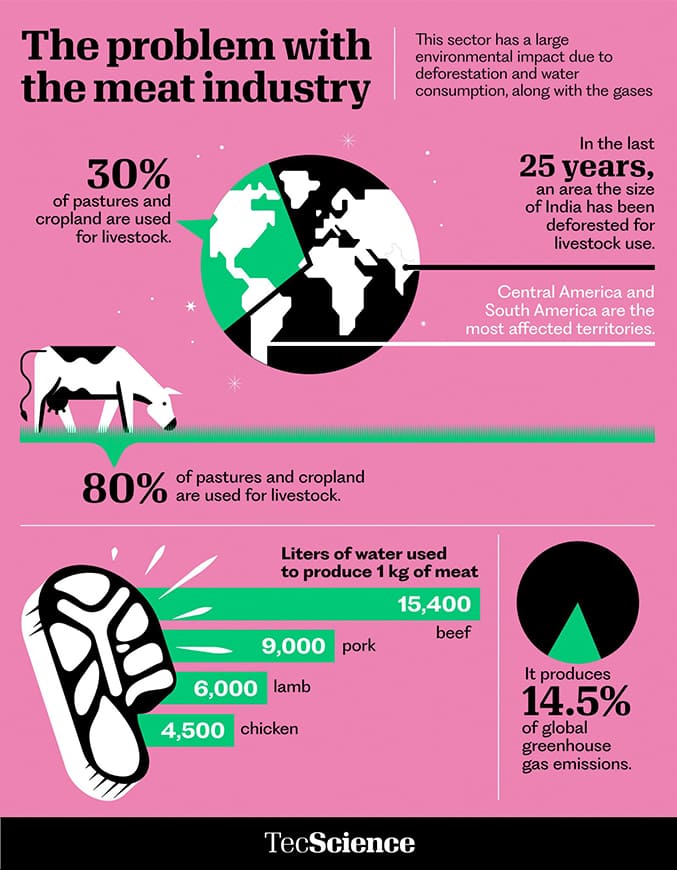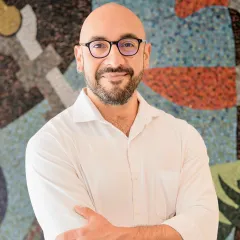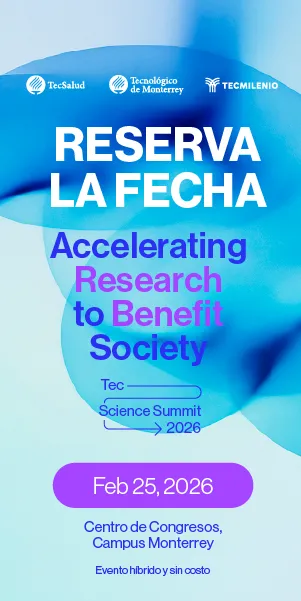We need to change the way we bring food to the table. The way we currently produce, distribute, and consume food is affecting our health, damaging the environment, and deepening social inequality crises. For this reason, transforming food systems is urgent.
To address this challenge, Tecnológico de Monterrey organized the first International Symposium on Food Systems Transformation in Mexico, where voices from science, policy, industry, and activism came together to chart a new path.
The goal: to spark an in-depth dialogue about the structural problems of today’s food system and to lay out guiding principles for its transformation into a more just, sustainable, and healthy model.
The event brought together experts from seven national and international universities, three government secretariats, two United Nations agencies, and multiple non-governmental organizations.
Based on their insights, a working document was constructed that will serve as the foundation for the next stage: making a joint call to the Mexican Government to advance in the elaboration of regulations for the General Law of Adequate and Sustainable Food.
Food systems encompass all the processes necessary for food to reach the consumer, from production to waste management after consumption.
From the table to collapse: the hidden cost of our food
According to the Food and Agriculture Organization of the United Nations (FAO), primary crop production increased by 28% between 2010 and 2023, reaching 9,900 billion tons.
However, this growth comes at an environmental cost. According to the United Nations Environment Programme (UNEP), the agricultural sector was responsible for 11% of the 57.1 gigatons of carbon dioxide (CO₂) emitted in 2023, equivalent to 57,100 billion tons of CO₂ released into the atmosphere in a single year.

Additionally, some of these foods cause damage to people’s health. In Mexico, according to the National Institute of Public Health, in 2023, 18.4% of adults lived with diabetes, although only one-third were diagnosed.

For Paola Abril Campos Rivera, a sociologist specialized in public health and research professor at the School of Government and Public Transformation (EGyTP) of Tec de Monterrey, and one of the Symposium organizers, the third crisis affecting current food systems is social inequality, where rural producers don’t have dignified incomes.
“In Mexico, for example, rural producers are, on average, between 60 and 65 years old. There’s no generational handover, and many migrate because living off farming is no longer profitable,” she explains.
In addition to these three dilemmas, there’s also the challenge of insecurity: in Mexico and other countries in the Global South, organized crime is involved in or affects the food supply chain.
In Michoacán, for example, it has been documented how these organizations extort avocado producers while helping them deforest to expand their plantations.
An Encounter to Imagine Another Way of Eating
Paola Abril Campos, Karina Sánchez, a specialist in food policies and food systems, and David Contreras, an expert in economics and health, who are also part of the School of Government and Public Transformation, decided to make a document to establish common ground from which to discuss the Symposium topics and know what needs to change in food systems.

For this, they used a methodology called Architecture of Horizons, within the School.
The methodology’s objective is “to create intelligence for complex and multidimensional problems. It allows us to know what knowledge base we all have, what the consensus is on a topic, what the divergences are among participants, to reach a common goal or path,” Sánchez explains.
Ayari Pasquier Merino, a doctor in social sciences from the Center for Interdisciplinary Research in Sciences and Humanities of the National Autonomous University of Mexico (UNAM), who participated in the Symposium, proposed discussing the structural elements that haven’t changed.
For Merino, it’s important to acknowledge that, despite the criticisms of the current food system, we continue to produce food under the same paradigm.
“The signing of the Free Trade Agreement, at the end of the 90s, profoundly transformed food systems, with the so-called neoliberal model. That model considers food as just another commodity. Still, it’s increasingly evident that, from different sectors, there’s a vindication that food, although inserted in economic exchanges, is not just another commodity, because it has to do with a human right,” she explains.
Faced with this structural problem, researcher Paola Abril Campos considers that public policies that place responsibility on individuals for the consequences of the food system are unfair.
She exemplifies with obesity and overweight in Mexico: “Since the eighties and nineties, we see prevalence rising. Did we all suddenly start making bad decisions? Or are there structural conditions that began to shape our food environments?”
Merino believes that criticisms of the current food industry are a seed of transformation. For her, a reform of food systems should include dignity as one of its principles. Meaning that people have the necessary conditions to choose healthier lives:
“That it would be much easier to leave your house right now and return in 15 minutes with something sufficient to prepare yourself a good meal without it costing half your paycheck and without including junk food.”
From Diagnosis to Action: What’s Next for Mexico
Karina Sánchez believes it is necessary to think about this transformation on two levels: what is produced in each region of the country and what people who inhabit those regions consume.
“At the production level, promoting crops that are native. At the consumption level, the General Law of Adequate and Sustainable Food proposes something called normative baskets, which would be nutritionally adequate food, but also culturally relevant.”
Campos, Sánchez, and Merino agree that this legislation contains significant advances for a positive transformation of the Mexican food system; however, it lacks regulations that help implement each of the published articles.
With that in mind, the next step for the Symposium organizers will be to make a joint call to the Mexican Government to continue the elaboration of these regulations.
Were you interested in this story? Want to publish it? Contact our content editor to learn more: marianaleonm@tec.mx

















